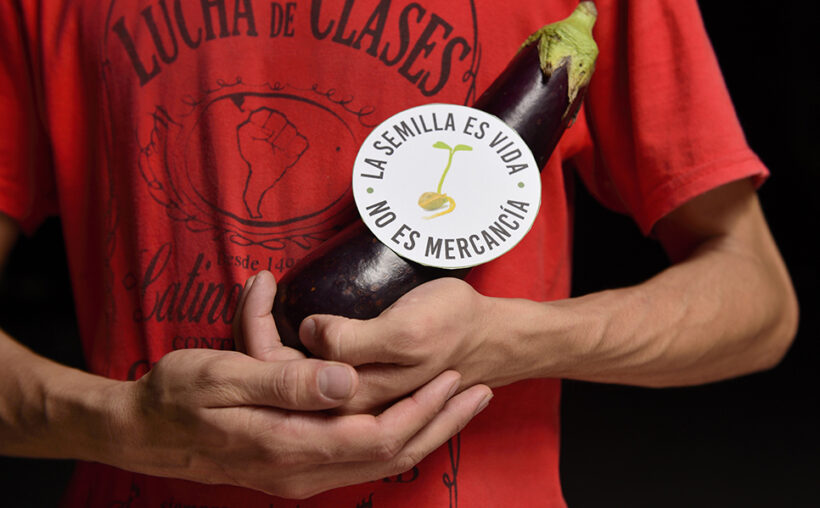Since Monday 15, representatives of various organisations and social sectors have been joining the plenary of deputies debating the mega-bill presented by Milei’s government, “Bases and Points of Departure for the Freedom of Argentines”. Its 664 articles will be substantial changes to a wide range of existing laws, affecting the rights and guarantees of broad sectors of the population.
One of these changes promotes Argentina’s accession to UPOV 91, the international convention that enables the intellectual property of seeds by large multinational corporations.
Representing more than 1,400 organisations that fight for food sovereignty, Marcos Filardi, from Red Calisas, explained to the deputies the request to reject the proposal. His presentation follows.
The intervention of Marcos Ezequiel Filardi, representing the Red de Cátedras Libres de Soberanía Alimentaria y Colectivos Afines (Red Calisas) in the plenary of commissions on 17 January 2024.
Good afternoon, ladies and gentlemen.
I have the honour of representing the Network of Free Chairs of Food Sovereignty and Related Collectives, known as “Red Calisas”, which brings together more than 60 spaces throughout the country that promote public discussion on the dominant agro-industrial model and, above all, the defence of another model, truly food-based, based on agroecology and Food Sovereignty.
In this capacity, I am going to refer specifically to Title III, Chapter VIII, Article 241 of the omnibus bill.
For the Food Sovereignty paradigm, seeds are the basis for the reproduction of life itself and a common heritage of peoples at the service of humanity.
For this reason, a few days ago, the Calisas Network issued a public statement entitled “We call on the National Congress to reject Argentina’s accession to UPOV 91”, which has so far received the support of more than 1400 organisations, collectives, cooperatives and assemblies from all over the country.
To be faithful to the collective will expressed in this statement, I will now read it out:
“On 27 December last, the National Government presented the draft “Omnibus Law” which among its 664 articles, number 241, establishes Argentina’s accession “to the International Convention on the Protection of New Varieties of Plants (1991).” This is the accession to UPOV 91 (by way of clarification, I would add that this is the latest version of the treaty on intellectual property of seeds), which is a long-standing desire of transnational seed corporations such as Bayer-Monsanto, Syngenta, Corteva or BASF, and “national” corporations such as Bioceres or Don Mario.
For years, this handful of corporations, through their organisations, have unsuccessfully sought to amend the current Seed Law (no. 20.247 of 1973), which recognises intellectual property (“breeder’s”) rights for the companies, but also guarantees farmers’ rights over the fruits of their harvests with certified seeds. Attempts to amend the law were systematically rejected by a wide range of producer and civil society organisations.
The incorporation of the country into an international convention such as UPOV 91, an international treaty with a higher hierarchy than laws, means that the current Seed Law will have to be modified to adapt it to its provisions, as is the case with countries that sign free trade agreements. Thus, a discussion that has been debated in parliament for more than a decade without consensus, is intended to be settled “from above”, without specific debate, in the framework of the express treatment of an “omnibus law”, and in extraordinary sessions”.
(Allow me to add here that Argentina’s accession to the 1978 version of UPOV, in 1994, took two years of treatment and discussion in this Congress of the Nation, and now the intention is to approve a much more restrictive version of the rights in less than a month, without making the text public and without a profound discussion in the heart of the Foreign Affairs Committee of this House, as is usually the case).
The statement continues:
“Accession to UPOV 91 represents the deepening of corporate enclosure of the first link in the entire agri-food chain: it recognises greater intellectual property rights over seeds, amputates the rights of producers by cutting off the possibility they have to make “own use” of their seed stocks, extends “protection” also to the harvest and enables the patenting of seeds.
What is at stake in article 241 of the bill is transcendental: whoever controls seeds controls the agri-food chain, and therefore the availability, quality and price of food for our population.
(Let me add here that the only thing that opposes the absolute control of 4/5 companies is the “free” own use, recognised by the current Seed Law and version 78 of UPOV to which our country has adhered, and which is framed in a conception of “farmers’ rights” as contemplated in the International Treaty on Plant Genetic Resources for Food and Agriculture (ITPGRFA).
“For all these reasons, we, the undersigned organisations, demand the National Congress reject the accession to UPOV 91, foreseen in article 241 of the omnibus bill, to protect the Food Sovereignty of our people”.
To conclude, I would like to make my own the words of Carlos Vicente, defender of seeds as the common heritage of peoples at the service of humanity, who in 2018 said:
“(…) the only thing they have done is to appropriate our seeds and that is to appropriate our right to food. That is why we know that we are not going to allow it (…) Taking care of seeds, multiplying them. And fighting. Because without land, seeds, and water, we do not feed ourselves. Food sovereignty and seeds as the heritage of the people, at the service of humanity, are banners that we will never lower”.
Thank you very much.






